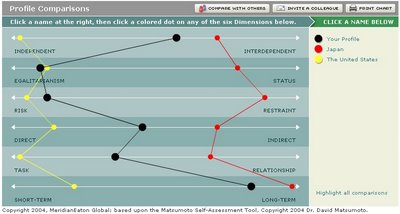I'll comment on that tomorrow, but I need to say this today...
Go. Buy. Read.
A Whole New Mind - Why Right Brainers Will Rule The Future - by Daniel H. Pink.
It's the best book I've read this year.
Here's a short version of the introduction.
Pink says that to be successful in this new world, we need to develop these Six Right Brain 'Senses': Design, Story, Symphony, Empathy, Play, and Meaning.
He then tells how.
I won't say more because you'll enjoy the discovery more if I say nothing...
Thursday, April 20, 2006
Reading "A Whole New Mind" - from Dallas, Texas
Tuesday, April 18, 2006
Worst Classroom Nightmares: Part 1

As I attend classes, I'm always learning on two levels.
The first level is, of course, the class materials.
It's a kind of 'out-of-body' experience to see another person facilitate a group.
In every group, we get students who are spaced along the learning continuum.
Some like to move fast, do exercises, make mistakes, and interact.
A few others like to move slow, learn theory, avoid mistakes, and reflect.
Most are in-between.
This group, however, was the first I'd seen that contained both extreme ends of the continuum.
As the instructor introduced the agenda, he mentioned that the first morning would contain a fair amount of lecture. This would build the basic concepts for our role playing in the afternoon.
Day two would be mostly activity-based.
At this point, an engineer raised his hand, and said (in a nutshell), "I won't want to do any role-playing until you've taught us all the theory. I'll need to understand the how's and why's. I'm not convinced that this method works. You'll have to convince me."
He continued for about 10 minutes, explaining his needs.
Not less than 5 minutes later, another student raised his hand and said, "We've already spent too much time discussing this. Can we move on to the exercises?"
Wow...
The next day and a half continued like this. The theory-based student asked a lot of detailed questions, while the action-based student kept reminding us that, "We're 2 hours into this class and we're on page 5".
Now, neither style is 'correct' or 'better' (though, personally, I resonate with the fast-paced action-learning style). I was just glad I got to watch this play out in a classroom that I wasn't leading!
What did I learn?
Well, I would have pulled the theory-learner aside and explained the design of the class.
If the activity pacing was too much for him, I would have recommended he pull out of the class.
If not, I would offer to answer his more esoteric questions off-line, or at lunch.
Course design can address these issues, as well.
A little data at the start (where did the model come from, what's its history) helps the theory-learning get comfortable.
It's also too much to expect that action-based learners will sit through a morning of lecture.
I would get an activity loaded into the front end of the class to satisfy them...
But we'll see when it happens to me!
Thursday, April 6, 2006
How to be Culturally Capable
 Yesterday, Clarence Eddy and I co-facilitated a class called "BKM's for Global Productivity".
Yesterday, Clarence Eddy and I co-facilitated a class called "BKM's for Global Productivity".
We work with 'global goddess' Heather Hinrichs of Meridian Resources to provide this class, which is based on the book "Working Globesmart" (highly recommended).
No better tool set exists for approaching an unfamiliar location than keen eyes, open ears, a flexible mind, and a willing heart.That said, Meridian provides an awesome tool called 'Globesmart' that identifies your cultural profile, and maps it to your target countries cultural profile. Gaps are then mapped, and the tool helps you identify a plan to close those gaps.
-Ernest Gundling, "Working Globesmart"
The picture above shows my cultural profile vs. US and Japan.
I map pretty well against Japanese culture in terms of Long-term outlook and Interdependence, but have large gaps in my views on Status and Risk.
Based on this information, I can prepare myself to adjust to the Japanese culture by:
- Ibserving and leverage protocols around age and title, where appropriate
- Focusing on how my programs avoid risk, as opposed to embrace risk
I never make a first trip without consulting it!
Wednesday, April 5, 2006
Do Your Acronyms Work?
Let's say, hypothetically, that you create a new position in your company and call it Chief Administrative Officer. So far, so good.
Next, let's say that - for lack of a better moniker - the group adopts that title as it's name.
For example, if you were going to have a planning session for that group, you might hang a sign on the door saying C.A.O. Planning.
Based on the above scenario, I learned something new about myself.
I learned that I'm wired differently than about 85% of my peers.
A couple of days ago, in a meeting, I referred to our group as 'CAO' (pronounced the only way I thought possible, 'cow'). I drew nothing but blank expressions from my teammates.
One member finally asked me, "What's a cow?".
(Cue 'Airplane'-style joke here, "It's a mammal that produces milk, but that's not important right now!")
I thought it was obvious, but upon further investigation, I found that only one other person (out of about 20 people) had made the leap from C.A.O. to 'Cow'.
Didn't anyone else watch "GET SMART" when they were growing up?
Anyway, I kinda like the name.
I always wanted to be a CAO-boy ('76-style, not '05-style).
Some find it a little 'unbusiness-like', however.
So, the lesson?
Read your acronyms aloud... they may surprise you...
